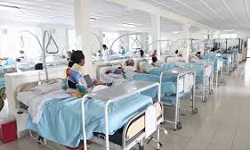OPINION – By Dawit Bisrat – Up to now, Ethiopia has evaded the worst of the coronavirus pandemic—but that may be changing. What for two months was just a trickle of reported cases of infection is swelling into what could become a flood. healthcare
In my role heading the Ethiopia office of Resolve to Save Lives, an initiative of the global public health organization Vital Strategies, I have seen firsthand how our national and local health systems have made use of the time to prepare for the coming deluge. Now, as the storm begins to rage around us, we must build on the improvements already undertaken, so we can come out on the other side of this pandemic even stronger than when we began.
The slow advance of the virus gave Ethiopia time to prepare. Steps the government took within days of the first reported case—such as canceling sporting events and closing schools—were crucial to delaying spread of the virus. Later measures such as limiting passengers on public transit systems and rationing the roadways, thus reducing travel between regions, have also bought us time.
But these tough public health and social measures can’t be sustained indefinitely, and the public needs support to continue adhering to them even in the short term. Without help, most Ethiopians say lockdowns will exhaust their money within a week and half will run out of food, according to a recent survey by the Partnership for Evidence-Based Responses to COVID-19. That’s why our health system has been implementing changes to handle a surge of infected patients, and to fortify the country against the disease in the long term.
Just months ago, even in Addis Ababa it was rare to come across a place to wash your hands. Now at the gates of every hospital there is a hand-washing station, and similar facilities have sprung up outside markets, hotels and houses of worship—to the point where frequently cleaning one’s hands is commonplace.
To address scarcities of washing facilities, local innovators have developed new types of contactless soap dispensers and foot-operated hand-washing stations. Not only do these simple improvements in hygiene curb coronavirus; they also protect against other infectious diseases. Given that diarrheal disease is the second leading cause of death among the country’s children, sustaining this in the long-term would save lives well after coronavirus is behind us.
The pandemic has also prompted overdue investment in the country’s beleaguered health care workforce. Tens of thousands of health extension workers who formerly helped the country reduce maternal mortality are now being trained to identify and refer suspected cases of COVID-19. The government has also signaled its support for doctors and nurses by offering life insurance to those who risk exposure to the disease—although the government must still do more to ensure that health workers have sufficient personal protective equipment to work safely. A stronger health care workforce, one that is effectively trained and equipped, will make for a more effective response to coronavirus as well as to other ongoing health challenges such as tuberculosis and HIV.
The pandemic has forced national and local health systems to coordinate better together, too, and we’ve seen huge improvements in how they swiftly distribute needed resources across the country. In the past, it took weeks to send medicine and other supplies to rural health centers and district hospitals on the peripheries of the health system; now those shipments arrive in days. The crisis has produced new collaborations, too, including a partnership with Ethiopian Airlines, whose mechanics have serviced some of the country’s scarce mechanical ventilators.
Most fundamentally, COVID-19 is prompting new thinking about the governance of health. Early in the pandemic, the country established a high-level ministerial task force to coordinate the national response, exemplifying the kind of intra-governmental cooperation we need in all our public health endeavors. The country has also used emergency assistance to increase health spending, a break from years when health expenditures as a share of GDP had not risen. Ethiopia has an opportunity to lock in those increases and prioritize further investment in its people’s well-being.
The course that the pandemic will take is up to us. But if Ethiopia makes smart choices, we have the chance to ensure that early success against COVID yields lasting improvements to our health systems.
EDITOR’S NOTE – Dawit Bisrat is the Country Representative (Ethiopia) at Resolve to Save Lives, an initiative of Vital Strategies

